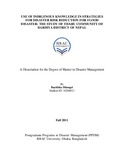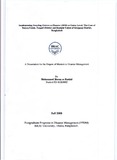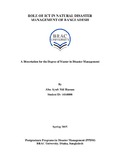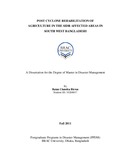| dc.contributor.advisor | Rahman, Rezaur | |
| dc.contributor.author | Dhungel, Rachhita | |
| dc.date.accessioned | 2012-05-24T05:14:32Z | |
| dc.date.available | 2012-05-24T05:14:32Z | |
| dc.date.copyright | 2011 | |
| dc.date.issued | 2011 | |
| dc.identifier.other | ID 10268011 | |
| dc.identifier.uri | http://hdl.handle.net/10361/1819 | |
| dc.description | This dissertation is submitted in partial fulfillment of the requirements for the degree of Master in Disaster Management, 2011. | |
| dc.description | Cataloged from PDF version of Dissertation. | |
| dc.description | Includes bibliographical references (page 42 - 43). | |
| dc.description.abstract | The main aim of this study was to explore the use of indigenous knowledge and practices
in Tharu Community to reduce the impact of flood disasters. Disasters are more frequent
and prominent at the present. Nepal is not an exception either. When the disaster strikes,
it is poor and marginalized groups that suffer the most. Tharu Community in Nepal is one
of the marginalized and vulnerable communities for flood hazards. Hence it is crucial to
increase the understanding about the ways which impacts of extreme events can be
reduced.
To carry our Disaster Risk Reduction approaches, it is first required to understand what
community needs. Promotion of new risk reduction options needs to consider local
tradition and norms to ensure their acceptability by the local people. In spite of huge
investments in the area of disaster management, losses continue to mount. The need to
bridge the gap between practice and policy with the recognition of indigenous knowledge
and local coping strategies is the must. Hence this paper is an attempt to understand the
local practices used by Tharu Community.
The research showed that the community people did have knowledge regarding the
changing climate and are putting their own efforts in order to cope up. They have their
own ways of forecasting and early warning systems. They are using the traditional ways
of embankment in order to minimize the adverse effects of flood. However, the indigenous
practices which proved to be useful in the past years were not enough to cope with the
rapid change in climatic patterns. Need to integrating scientific strategies in these
indigenous practices is a must. | en_US |
| dc.description.statementofresponsibility | Rachhita Dhungel | |
| dc.format.extent | 46 pages | |
| dc.language | en | |
| dc.publisher | BRAC University | en_US |
| dc.rights | BRAC University dissertation are protected by copyright. They may be viewed from this source for any purpose, but reproduction or distribution in any format is prohibited without written permission. | |
| dc.subject | Disaster management | |
| dc.subject | Flood disaster | |
| dc.subject | Disaster risk reduction | |
| dc.title | Use of indigenous knowledge in strategies for disaster risk reduction for flood disaster: the study of Tharu community of Bardiya district of Nepal | en_US |
| dc.type | Dissertation | en_US |
| dc.contributor.department | Department of Architecture, BRAC University | |
| dc.description.degree | M. Disaster Management | |




